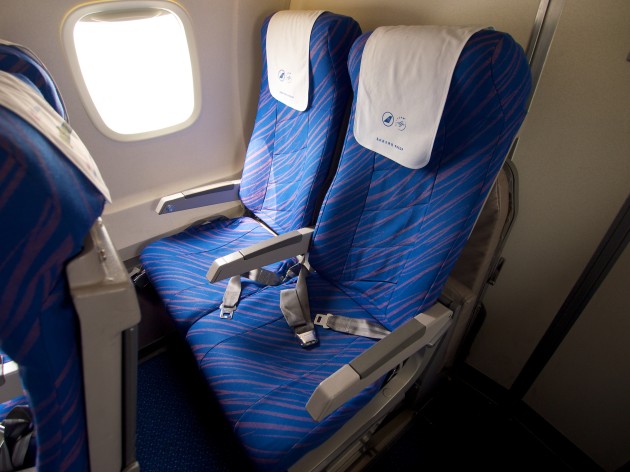
by Sarah M. Seltzer
Street Harassment, Seat Harassment and Women’s Bodies
 Let’s conduct a thought experiment. A far right wing Christian preacher claims a direct revelation from God, and it goes something like this: Jews are the chosen people. So chosen, so holy, the group from whose midst Christ emerged, that they cannot be touched.
Let’s conduct a thought experiment. A far right wing Christian preacher claims a direct revelation from God, and it goes something like this: Jews are the chosen people. So chosen, so holy, the group from whose midst Christ emerged, that they cannot be touched.
Literally.
So, says the preacher to his congregation, if you find yourself next to a Jew on a train or an airplane, you should ask to change seats immediately. Get up, stand in the aisle, change seats. Ask nicely, of course! Really, it’s not discrimination, they assure the rest of us. It’s personal religious practice. And Jews, if you get this request from a sect member, just try to be cool about it, okay? Let’s not reinforce the reputation that we Jews are pushy and difficult and always angry about anti-Semitism. It’s not an insult from these folks, it’s an honor.
I doubt my fellow Jews would heed calls to “tolerate” this treatment, and the embedded insults, in the name of religious freedom?
So when public discrimination — as in the case of the ultra-religious men who nudge women, gently or not, to switch seats on flights to Israel — is both gendered and given the blessing of religious authorities, why do always we hear calls to accommodate segregation? I read Elana Sztokman’s and Tova Ross’s dueling perspectives on the Haredi gender airplane issue with growing interest. Sztokman argues that women shouldn’t have to bear the indignity and inconvenience of moving seats to make Haredi men feel halachically a-okay, while Ross, optimistic, exhorts her fellow Jewish women to lighten up:
We are indulging a request that we may neither understand nor agree with, but if it doesn’t really put us out, if the flight isn’t full and there is in fact someone who will easily volunteer to switch seats, then what is everyone’s colossal problem with the mere premise?
The premise that offends, colossally so, is this: that women are a different class of human than men. The premise that offends is: “separate but equal.” This isn’t in shul, or at home, where individual choice and practice rightly reign. This is in the public sphere. And in the public sphere, of which airplanes are a part, discrimination is not okay. It’s not okay and it’s fundamentally demeaning, even if you’re not personally insulted by the tenor of the request. Like Sztokman, I have grown tired of discrimination against women, in particular — whether it’s anti-choice or anti-birth control or anti-sitting-in-proximity— getting a free pass because “hey, it’s religion.” This is the same religion-as-cover-for-patriarchy mentality that allows employers to refuse to cover birth control for women, and the highest court in the land to enshrine bosses’ right to be icked out as having a higher value than womens’ right to essential health care.
No matter how exalted women are said to be held in Orthodox religious circles, any public focus on the properties of female bodies necessarily becomes a manifestation of patriarchy. In fact, it’s the exact same principle that makes men think they can holler at women on the street with impunity. When feminists focus on street harassment, as we have recently seen thanks to a viral video, men immediately worry about the implied fate of a well-meaning “hello.” They will die upon the hill of that nice hello. The fabled nice “hello-ing” guy on the street is not unlike the Yeshiva student who gently asks a woman on El Al to move, and drops his request when he sees that she can’t. They are alike in that they are both friendly-faced participants in an overall insidious practice. Just as a “hey baby” on the street can easily escalate into threats if overtures are rejected, so can a request to move seats easily devolve into harassment, discomfort, isolation for the woman in question. In a patriarchy, that threat is always implicit. Some people don’t mind hellos on the street or at a bar, others don’t mind the seat-changing request. Many will react differently depending on context. But no one should be asked to endure either kind of intrusion with good will, or run the risk of being caricatured as overly sensitive or angry.
At the risk myself of sounding like a broken record, I’ll note again that both street harassment and seat harassment revolve around the idea that women’s bodies are inherently up for discussion, and occupy a essentially different place in public than men’s do. At its heart, that’s an offensive, unequal starting point. In defiance of that unfair principle, then, there’s nothing wrong with merely asking seat-segregation advocates adherents to pony up for a pre-determined spot on the plane free of female presence, effectively returning their segregation to a private sphere, without having to bother the rest of us.